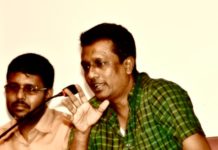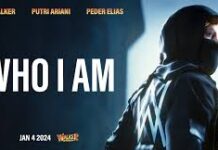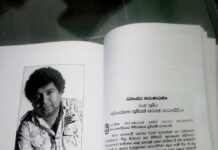“Conscience” is a deeply misleading notion. Because most of the time conscience refers to the guilt we experience if we are engaged in an immoral activity which is against the social norms. Or else it refers to an injunction to enjoy, seek hedonism, against the social controls and demands. To take a notorious example, conscience either orders us to return to the harmonious married life if one is involved in an alternate love affair or it injunctions us to break away from the boring and monotonous married life, and seek enjoyment in an alternate love affair. Or else in a political context, conscience functions in such a manner that, if I am engaged in a public protest on the streets, tired whole day fighting for rights, it’ll make myself guilty all the time convincing me that these peripheral struggles will not change anything and that my energy is just a waste and that I should just go enjoy myself at the bar; or else if I am just sitting at home watching late evening news after an unbothered day at my comfortable air-conditioned office, it will make me guilty all the time for not actively participating in the struggle on the road. Simply, conscience either makes us guilty for not adhering to the Law or commands us to breach the spell of Law. It is never fixed, but makes us guilty for not doing otherwise. This therefore is nothing other than the Freudian Superego that haunts us all the time. From the psychoanalytic point of view, breaking the spell of Superego is never easy and often warrants us to distance ourselves, critique, and traverse the fantasy that provides the coordinates to it. In this sense, letting our conscience to rule will add insult to injury and will never assist us to bring some meaning to the chaotic political situation.
The necessary consequence of the illusory nature of our own conscience means that we as the general public don’t know what to do in sudden political upheavals where we are forced to take a stance on. Leaving apart the due critique on Mass Media which carry us on various Ideological paths when we are faced with a deadlock to make a decision, let’s focus our attention then to the crucial question: to whom should we listen to in such a chaotic situation when we cannot even trust our own conscience? Let’s for the moment atleast carry the assumption that, we should listen to “somebody” who is in some sense in a better “position” to make a call. Let’s save it to later, what this position might be.
Professor Rohan Samarajiva (the current Chair at ICTA) in a provocative article titled “How to spot a Potential Public Intellectual” published in 2017, compelled us to ask two questions (rules of the thumb as he called it) to recognize if a popular public-addresser is actually a Public Intellectual. According to Prof. Samarajiva, one has to ask firstly “whether the intellectual is basing his or her contribution on some kind of evidence?” and secondly “Is the presented evidence of adequate quality?” to spot such an intellectual. In a country where blowhards are abundant, his rules seem very pertinent. However, let’s analyze his proposal concerning our recent chaos where it once seemed that all politicians and their spokesmen became public intellectuals in interpreting the constitution and defining democracy. Truly the (middle-class) public was in panic, and rightly so, simply because, during the chaotic period, when any public-addresser gave an ‘opinion’ about the crisis, they all did by referring to a specific and identifiable provision of the Constitution. It was a crisis of credibility since everyone, from an average parliamentarian to the modest partisan of the respective political camps based their articulations on either Constitutional provisions, or Parliamentary Standing Orders or at least some previous political precedents which in the sphere of politics are extremely crucial. For example, in assessing President Obama’s legacy it is important to note only what he did, but also what didn’t do – not attacking Iran or Venezuela when the political pressure was still mounting. Therefore on a later stage if one refers to President Obama’s omission to attack Iran in justifying or evidencing a future political proposal/decision (let’s say as a reason to not to attack North Korea) is no less important than a previous case law concerning Cuban missile crisis. To further complicate Prof. Samarajiva’s position, let’s ask the even more difficult question: does “knowing it all” – propositions backed by qualitatively higher evidence – pushes one to a higher ethical decision? Exploration of this question can be best accomplished again by reference to Cinema – this time to War on Terror (WT) films, especially Eye in the Sky by Gavin Hood.
The best way to approach this question on my view, is by looking at how this question gets played out in the crucial decision-making scene in Eye in the Sky. With strong connotation with the American stage drama 12 Angry Men, Eye in the Sky shows an eternal playing with the hierarchy to make a decision whether to capture or strike at a well screened terrorist Susan Helen Danford, which is (fakely) problematized by the existence of Alia – a small girl – in the vicinity of the attack. The scene runs in the guise of a better judgement of collateral damage to avoid fatally injuring poor Alia.
Before coming to our own adjudication of the above decision, it is quite important to see how the mission in Eye in the Sky transformed from a ‘capture mission’ to a ‘kill mission’. The key protagonists of the film – Colonel Powell, General Benson, Attorney General, Foreign Minister, Prime Minister, etc – base their all important decisions from live data streaming from Kenya. More accurately, the mission changed from a capture mission to a mission to kill Denford when the decision-makers find that inside the terrorist house that Denford secretly holds a meeting, there seems to be two suicide bombers arming themselves for a future imminent attack (so we are told). The key feature that shouldn’t be missed at this point is that the information that there are two suicide bombers inside the house doesn’t come through to the mission commanders from good old military intelligence means. But rather, the information comes through Ornithopter and Insectothopter camera surveillance that is brought and facilitated by the Somalian agent played by Barkhad Abdi. This information, the live telecast of two potential suicide bombers arming themselves in the very house that Denford holds a meeting, forces the mission commanders, especially Colonel Powell to change the mission to a strike.
Before analyzing the very nature and the philosophical grounding of this so called perfect information, there is a crucial feature that needs sufficient attention which many critics on this film miss. The cord that connects the pre-strike (capture) reality with the pro-strike reality is as stated before, provided by the information that comes from the strike location itself. Two aspects of this information needs further elaboration. Firstly, the information for the purported mission for the great Western powers do not come in the form of old day CIA agents or due to their immensely potent intelligence network, but rather due to an extremely perverted covert surveillance that is used in the service of the commanders from the most brutal form of technological exploitation. It is as if the Western powers exert their benevolent power by regressing to a spectral presence of insects and birds.
However, the situation is never complete without the second most crucial feature, which is that, even for the most technologies to operate, the existence of a perverted instrumental evil – in the Kantian sense (in reference to Immanuel Kant) – is required. This character is played by the Somalian agent on the ground who makes himself a mere instrument of the Other’s enjoyment. It is only through a perverted figure like him that the entire power edifice completes its grasp on its subjects. As philosophers such as Hannah Arendt, Giorgio Agamben and Slavoj Zizek has expounded eloquently, every totalitarian regime has the character of perversion, where the ruling authority perfectly knows what the ‘desire of the Other’ is (i.e. what the other persons likes and dislikes, and in what way and how he/she likes/dislikes them), so that the lower-level still more pervert agents can fully execute the Other’s enjoyment (in this case the enjoyment of the authority) by being his mere instrument. Therefore, given the crucial knot that Abdi makes in the film, it would be completely insufficient to hail the technological impetus of the West at the expense of not expounding the fact that such a technological power only functions through a perverted subject. He is therefore the vanishing mediator upon which the entire film rests upon. Hence he also represents the gaze point for which the spectator is blind about.
Jean-Pierre Dupuy (the French Philosopher) describes in an unsurpassable manner the basic deadlock of Big Data: “the prevention of future crimes leads us to one of the oldest pragmatic paradoxes that humanity has faced ever since it started posing ethical questions”. The paradox to which Dupuy refers to here is that the very prediction of a crime (a terrorist attack) prevents it from happening. The paradox is much acute than it may appear: on the one hand, as is the case in Eye in the Sky, an apparently logical calculation is made about a future terrorist attack (that of the two suicide bombers) which makes it possible to prevent it from happening; on the other hand, it was not any divine intelligence, but the very prediction that an attack (even with presumed calculations of casualties) is going to occur and hence its very preemptive action, that prevents the very attack from happening. This paradox is made absolutely clear in Eye in the Sky: the perverted, all too close, all-encompassing information about the suicide bombers induce the mission commanders to order a strike ‘before’ the terrorist attack from happening. Therefore, it becomes clear that there is no ontological proof that an actual terrorist attack were to take place to base the preemptive action upon. The lack of any ontological proof to make a decision opens up the space for a “plague of fantasies”. Here is the moment that we unconsciously let our conscience rule.
In view of our preceding discussion, it can be demonstrated that, the decision to strike the enemy house in Kenya, by the decision-making mission commanders, involved a the situation of an absolutely impossible gaze point from which the commanders purported to imagine the fantasmatic case of the victims (casualties) of a future suicide terrorist attack appealing to them and asking them to act on behalf of them before their lives are victimized in vein (we can see the close affinity between these victims and the victims of democracy in our situation). As Zizek writes, “apropos of a phantasmic scene, the question to be asked is thus always: for which gaze is it staged? Which narrative is it destined to support?”; the gaze according to which the commanders of the situation base their decision to attack is that of future victims of the attack, which as we saw cannot gain any ontological proof, since it has never taken place. What does the influx of information do then? How does it function? The only possible logical answer to the so called ultra-accurate data/evidence coming directly from the battle field is that they obscure any rational decision making by plaguing us with impossible fantasies. Therefore, not only the “know it all” doesn’t push one to a position of ethical decision making, it obscures any minimal possibility of rational argumentation.
Therefore, the only logical assertion that remains to be made about the perverse flow of information to the decision making floor is that, they saw “too much”. The commanders saw too much that plagued them with fantasies that obscured any rational decision making. Isn’t this our daily situation watching evening news? One further point needs to be made at this juncture; that is, it is not that what the commanders saw empirically was wrong or inaccurate. Even in the case of the protagonist character of Maya in Zero Dark Thirty, it would fail in its purpose, if we are to claim that Maya’s information about Bin Laden was wrong and that his killing would have been avoided. This is the wrongful postmodernist path that purports to refrain from any decision making at all, which also mystifies the impenetrability of the “Otherness” of the Other in the Judith Butler (the American philosopher) sense. Empirically, in most of the aforementioned cinematic situations of decision making, their information was true and accurate, only that their predictions were based on the perverted form of information obscured our clear view to make a choice out of Love. Therefore, given this deadlock, the only modernist argument to make, is that they saw too much and much less of what they saw would have pushed for better ethics. In other words, to phrase the radical ambiguity of information at play here, one is tempted to claim that seeing too much informed much less while seeing much less would have informed them more. What we find here a radical disconnect between what we as ordinary people see and are informed. Or to put in yet another way, also in reference to Prof. Samarajiva’s articulation about Public Intellectuals, “abstraction” is a much powerful tool of ethical activity than pseudo concrete empiricism/realism that misses it all.

In this sense, true Public Intellectuals are champions of abstraction, and not detectives of evidence. True Public Intellectuals re-articulate the questions themselves and are not bothered by the accuracy of the answers, for no matter how much your answer is backed up by evidence, one can answer wrong questions with accurate evidence. What Prof. Samarajiva’s rules of thumb do not capture is the true obsessional neurotic position (in the psychoanalytic sense): an obsessional always lies in the guise of a truth. For example, as we all know, we can very earnestly mourn and recite ‘factually’ true details of how I would miss a relative of mine (let’s say grandmother) who has recently passed away, from how I would have enjoyed a vacation with her which we planned together, to how lucky she would be in paradise now that she doesn’t need to take care of my children while I was working etc., although my true desire is that she would have ruined our family vacation due to her unconstrained demands of age or that truly her demise means that I now really have to think what I should do with my children when I am off for work. In this sense factual truth means very little in a chaotic reality. Can we not say the same about the situation we faced recently? Weren’t all those constitutional pundits of October 26th constitutional calamities in Sri Lanka lying in the guise of a truth, no matter how accurately they referred to the constitutional provisions? Isn’t the Parliamentary Select Committee (of Sri Lanka) set up to investigate the Easter Attacks an epitome of this attitude of lying (pre-determined to corner the President) in the guise of a truth (an impartial truth seeking mechanism)? This therefore means that a person who backs up his/her claims by qualitatively higher evidence (no one will dare to call constitutional articles as of lower quality) is effectively not in a better “position” to make a call upon the chaotic political situation. Then, who would?
Dilshan Fernando



















